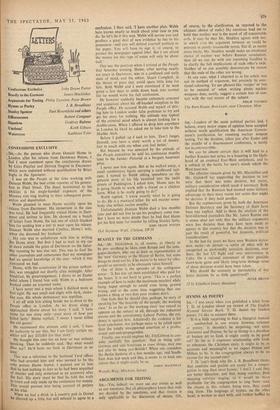Confessions Exclusive John Deane Potter Beastly to the Germans James
Mackinlay Arguments for Testing Philip Toynbee, Peter Brown Hymns as Poetry J. B. Broadbent Stanley Spencer Paul Bloomfield and others Efflorescence Robert Conquest Siqueiros Godfrey Rubens Unclean! Keith Gibson Watercress Kathleen Tyler CONFESSIONS EXCLUSIVE
SIR,—As the person. Who drove Donald Hume to London after his release from Dartmoor Prison, I feel I must comment upon the conclusions drawn by Giles Playfair and Derrick Sington in Encounter Which were endorsed without qualification by Brian Inglis in the Spectator.
I was on the People at the time working with Duncan Webb, the best crime reporter of his genera- tion in Fleet Street. The finest testimonial to his abilities is his single-handed exposure of the Messina vice ring leading to their subsequent prose- cution and deportation.
Webb planned to meet Hume secretly upon his release from Dartmoor. His immersion in the case was total. He had frequently visited Hume in Dart- moor and written to him. He showed me a bunch of letters from Hume, the last one of which thanked him for sending him a suit to wear upon his release. Duncan Webb also married Cynthia, Hume's wife, when she divorced her husband.
My role was to collaborate with him in writing the Hume story. But first I had to wait in my car at dawn outside the gates of Dartmoor on the Satur- day morning he was due out. This was to fool the other journalists and cameramen that my newspaper had no special knowledge of the case—which it was rumoured we had.
Hume, with the connivance of the prison authori- ties, was smuggled out shortly after midnight. After breakfast, by prearrangement, I drove to an Exeter hotel where I found him with Webb in a bedroom booked under an assumed name.
1 have never met a man whom I disliked more at first sight. He was small and slight with dark, snake- like eyes. His whole demeanour was reptilian.
I set off with him sitting beside me to drive to the People office in London. As we drove along I approached Hume about his story. I said, 'I have come for one story only—your story of how you killed Setty.' Hume replied, 'I swear I never killed the old geezer.'
He maintained this attitude until I said, 'I have no authority to say this, but I am fairly certain my editor will pay £10,000 for that story.'
He thought this over for an hour or two without speaking. Then he suddenly said, 'Bqt what would Mac say? He'd have me back in Dartmoor in no time,'
This was a reference to the Scotland Yard officer who had arrested him and who seemed to be the only person Hume feared. I pointed out to him that he had nothing to fear as he had been acquitted of murder and only sentenced as an accessory after the fact. His story must be that he told the truth in court and only made up the confession for money. This would prevent him being accused of perjury at his trial.
When we had a drink in i country pub in Dorset be cheered up a little but still refused to agree to a confession. I then said, 'I have another plan. Webb here knows nearly as much about your case as you do. So let's do it this way. Webb will accuse you and produce a great deal of new evidence he has in his possession--and you will defend yourself publicly in the paper. You will have to sign it, of course, to protect the newspaper against libel. But I am afraid the money for this type of series will only be about half.'
This was the position when I arrived at the People that Saturday evening. Hume, after serving nearly ten years in Dartmoor, was in a confused and surly state of mind, and the editor, Stuart Campbell, in the throes of press day, could spare little time for him. Both Webb and 1 were convinced if he were given a few days to settle down back into normal life he would write his full confession.
He however suddenly became extremely annoyed and suspicious about his off-handed reception in the People office. He accused Webb and myself of driv-
ing him to London under false pretences to try and get his story for nothing. His attitude was typical of the criminal mind which is always looking for a double-cross. When I offered to drop him anywhere in London he liked he asked me to take him to the Marble Arch.
Before I pulled up •I said to him, 'Don't forget, Donald, you have a story worth a lot of money. Get in touch with me when you feel better.'
But because he was annoyed by the attitude of the People executives he sold his confession months later to the Sunday. Pictorial at a bargain basement price. I never saw him again. But as he walked away, a
small unobtrusive figure carrying a cardboard Suit- case, I turned to Webb sitting speechless as the greatest story of his life vanished into the twilit streets of Paddington. 1 asked him, 'Hume, says he is going North to work with a friend on a chicken farm. What is he really going to do?'
Webb replied, 'I know exactly what he is going to do. He is a maniacal killer. He will murder some- body else within twelve months.' Unfortunately Duncan Webb died a few months later and did not live to see his prophecy come true. But I have no more doubt than he had that Hume got his first taste for murder by killing Stanley Setty. JOHN DEANE POTTER 18,4 Seymour Walk, Chelsea, SW10






































 Previous page
Previous page